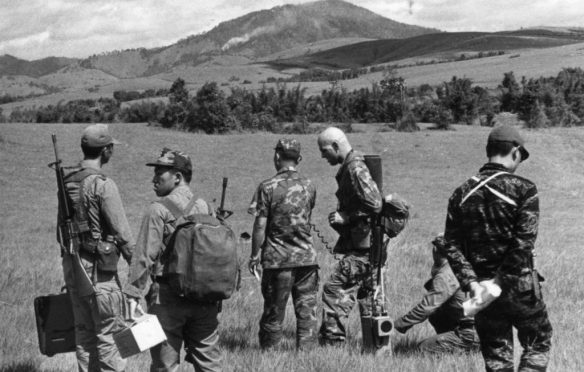Throughout 1969 and 1970, Nixon and Kissinger focused the CIA on the secret expansion of the war in Southeast Asia. They ordered the agency to make $725,000 in political payoffs to President Thieu of South Vietnam, manipulate the media in Saigon, fix an election in Thailand, and step up covert commando raids in North Vietnam, Cambodia, and Laos.
In a bleak dispatch on the eve of a world tour that took Nixon across Southeast Asia, Helms told the president about the CIA’s long war in Laos. The agency “maintained a covert irregular force of a total of 39,000 men which has borne a major share of the active fighting” against the communists, he reminded Nixon. They were the CIA’s Hmong fighters, led since 1960 by General Vang Pao. “These irregular forces are tired from eight years of constant warfare, and Vang Pao…has been forced to use 13-and 14-year-old children to replace his casualties…. The limits have largely been reached on what this agency can do in a paramilitary sense to stop the North Vietnamese advance.” Nixon responded by ordering Helms to create a new Thai paramilitary battalion in Laos to shore up the Hmong. Kissinger asked where it would be best to bomb Laos with B-52s.
While their clandestine war in Southeast Asia intensified, Nixon and Kissinger made plans for a secret rapprochement with Chairman Mao Tse-tung. To clear the way to China, they strangled the agency’s operations against the communist regime.
Over the past decade, in the name of combating Chinese communism, the CIA had spent tens of millions of dollars parachuting tons of weapons to hundreds of Tibetan guerrillas who fought for their spiritual leader, His Holiness Tenzen Gyatso, the fourteenth Dalai Lama. When Allen Dulles and Desmond FitzGerald briefed Eisenhower on the operation in February 1960, “the President wondered whether the net result of these operations would not be more brutal repressive reprisals by the Chinese Communists.”
Ike approved the program nonetheless. The agency set up a training camp for the Tibetan fighters in the Rocky Mountains of Colorado. It had paid an annual subsidy of some $180,000 directly to the Dalai Lama, and it created Tibet Houses in New York and Geneva to serve as his unofficial embassies. The goal was to keep the dream of a free Tibet alive while harassing the Red Army in western China. The results to date had been dozens of dead resistance fighters, and one bloodstained satchel of invaluable Chinese military documents seized in a firefight.
In August 1969, the agency requested $2.5 million more to support Tibet’s insurgents in the coming year, calling the 1,800-man paramilitary group “a force which could be employed in strength in the event of hostilities” against China. “Does this have any direct benefit to us?” Kissinger asked. He answered his own question. Though the CIA’s subsidy to the Dalai Lama continued, the Tibetan resistance was abandoned.
Kissinger then scuttled the remains of the CIA’s twenty-year mission to conduct clandestine operations against China.
The commando raids of the Korean War had dwindled down to desultory radio broadcasts from Taipei and Seoul, leaflets dropped on the mainland, fake news planted in Hong Kong and Tokyo, and what the agency described as “activities worldwide to denigrate and obstruct the People’s Republic of China.” The CIA kept working with Generalissimo Chiang Kai-shek in his doomed effort to free Taiwan, unaware that Nixon and Kissinger had plans to sit down with Chairman Mao and Prime Minister Chou En-lai in Beijing.
When Kissinger finally sat down with Chou, the prime minister asked about the latest Free Taiwan campaign: “The CIA had no hand in it?”
Kissinger assured Chou that “he vastly overestimates the competence of the CIA.”
“They have become the topic of discussion throughout the world,” Chou said. “Whenever something happens in the world they are always thought of.”
“That is true,” Kissinger replied, “and it flatters them, but they don’t deserve it.”
Chou was fascinated to learn that Kissinger personally approved the CIA’s covert operations. He voiced his suspicions that the agency was still subverting the People’s Republic.
Kissinger replied that most CIA officers “write long, incomprehensible reports and don’t make revolution.”
“You use the word revolution,” Chou said. “We say subversion.”
“Or subversion,” Kissinger conceded. “I understand. We are conscious of what is at stake in our relationship, and we will not let one organization carry out petty operations that could hinder this course.”
That was the end of that. The CIA was out of business in China for years to come.
